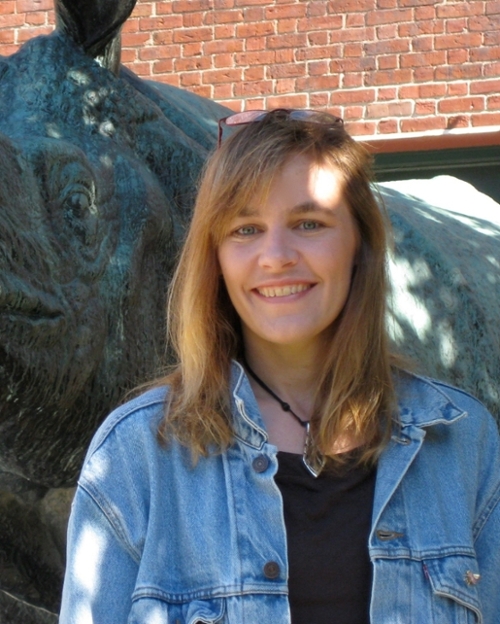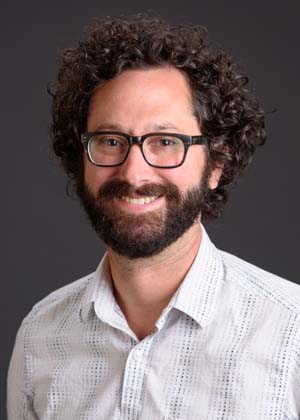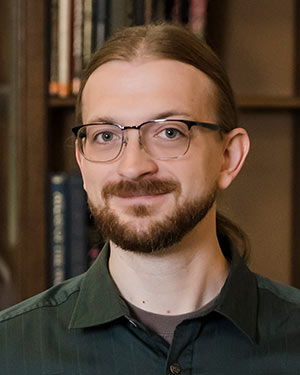Faculty
Biology
 Derek Applewhite
Derek Applewhite
Actin/microtubule regulation of neuronal shape
I am happy to have joined the community here at Reed in 2014. I received my B.S. from the University of Michigan in 2002, and my Ph.D. in Cell and Molecular Biology from Northwestern University in 2007. As a cell biologist I subscribe to the mantra "seeing is believing." Microscopy and cell imaging techniques have revolutionized the field, allowing us to observe phenomena at a level of detail unimaginable to scientists just a few decades ago. I strive to incorporate imaging and microscopy into the classes I teach as well as in my own research. The courses I currently teach include Biology 101, Cell Biology (Bio 372) and Cytoskeletal Dynamics (Bio 431), which is my particular field of expertise. The cytoskeleton is a network of filaments found within cells that regulate cell shape (morphology) and how cells move (cell motility). Our understanding of how the cytoskeleton is regulated is fundamental to our knowledge of how immune cells combat pathogens, neurons make connections in our brains, or how cancer cells migrate during metastases. My lab uses the humble fruit fly (Drosophila melanogaster) to study these basic properties of cells. Find more details on my website.
 Kara Cerveny (Chair 2023-24)
Kara Cerveny (Chair 2023-24)
Neuonal differentiation in zebrafish retina
Kara earned a BS in Biology from Duke University, a Ph.D. in Biochemistry, Cellular, and Molecular Biology from Johns Hopkins School of Medicine, and conducted research as a post-doctoral fellow at the University College London, before joining the Reed Biology faculty in 2012. She teaches Developmental Biology with lab (BIO 351L), Developmental Neurobiology (BIO 431, an advanced conference-style course that focuses on historical and current topics in the visual system), and Introduction to Biology (Cells and Development Module, BIO 102). She also mentors year-long thesis projects (BIO 471) and semester-long independent studies (BIO 481). The research in Kara's lab focuses on how cells transition from proliferation to differentiation in the developing zebrafish visual system and is supported by the NIH National Eye Institute and the MJ Murdock Trust. Kara has a passion for sharing the beauty of biology and is always happy to share movies and images of developing zebrafish with any who would like to tour her lab.
 Suzy Renn
Suzy Renn
Behavioral genomics in African cichlid fish
Through the synthesis of comparative genomics with functional studies in behavior, physiology, and ecology, I aim to understand the genomic basis of behavior from an evolutionary perspective. By understanding the molecular basis of species-specific, and context-specific behaviors, I aim to determine if similar behaviors result from conserved, or converged processes of evolution.
The African cichlid fishes have experienced an incredibly rapid recent and repeated evolutionary radiation that has resulted in thousands of closely related species that exhibit a wealth of morphological and behavioral diversity despite very low genomic sequence divergence. In the Renn Lab we aim to identify the structural and functional differences among genomes that are responsible for this rich species diversity. I'm currently the chair of the Interdisciplinary Neuroscience Committee.
 Erik Zornik
Erik Zornik
Social and hormonal influence on neural circuits
Erik is a neuroscientist with a broad interest in understanding how brains generate behaviors. He studied cell and molecular biology at the University of Michigan (BS '97), trained in neurobiology as a graduate student at Columbia University (PhD '06) and was a postdoc at Boston University and the University of Utah. His research primarily investigates how neurons and neural circuits generate vocal behaviors of the African clawed frog, Xenopus laevis. Much of his research employs electrical recordings of vocal neurons. Since arriving at Reed in 2012, he has also been collaborating with Reed students to use molecular tools to identify genes that are critical for the production, development and evolution of frog vocalizations. Erik's courses focus on understanding how neurons work, and how nervous systems control physiologically critical functions such sensory processing, movement, and metabolism.
Psychology
Leia Harper
Psychophysiology and psychosocial factors in nervous system responses to stress
 Greg Jensen
Greg Jensen
Behavior analysis, comparative cognition, applied statistics
Prior to graduate school at Columbia University (earning my Ph.D. in 2014), I spent a decade in Reed's psychology department, first as an undergraduate, and subsequently managing Allen Neuringer's lab. These formative years taught me the value of studying psychological processes using a comparative approach, with both human and animal experiments providing their own pieces of the puzzle. Since obtaining my doctorate, the focus of research in the Jensen Lab has been the fundamental mechanisms of abstract thinking and cognitive representation. When we perform logical comparisons and make intuitive inferences, we engage heuristics that we share with other species and that predate the evolution of language. I am also an enthusiastic advocate for statistical methodology. Thanks to advances in both theory and in the computational tools available, there has been an explosion of possibilities in both the experimental designs we can undertake and the precise psychological theories we can formulate.
 Michael Pitts
Michael Pitts
Cognitive neuroscience of attention, perception, and consciousness
My courses include introductory psychology, sensation & perception, cognitive neuroscience, attention & consciousness research, and neuroscience of consciousness. In most of these courses, students read, discuss, and critique research articles, learn the methodological techniques of cognitive neuroscience and psychophysics, and develop novel experimental questions that can be explored in the laboratory.
My area of expertise is in cognitive electrophysiology of perception and attention. I specialize in electroencephalography (EEG), event-related potentials (ERPs), and psychophysics. Some of the major questions my research seeks to resolve are: How does brain activity differ during conscious versus nonconscious processing of objects and events? Which cognitive functions require attention and awareness and which can be carried out automatically? Are attention and awareness fully dissociable? My laboratory includes two 64-channel EEG systems that can be used to record and map the brain waves of human subjects while they perform visual and auditory tasks.
Emeriti
Reed College has a rich history in neuroscience led in the recent past by professors Dell Rhodes and Enriqueta Conseco-Gonzalez, Allen Neuringer, and Tim Hackenberg in the Psychology Department and professors Steve Arch, Frank Gwilliam, and Maryanne McClellan in the Biology Department.